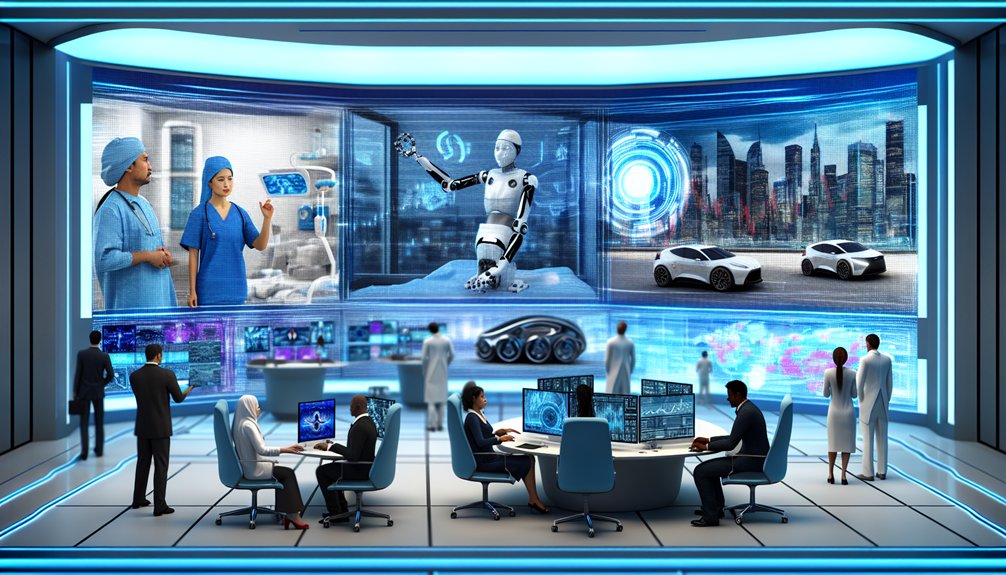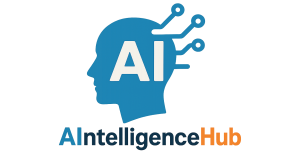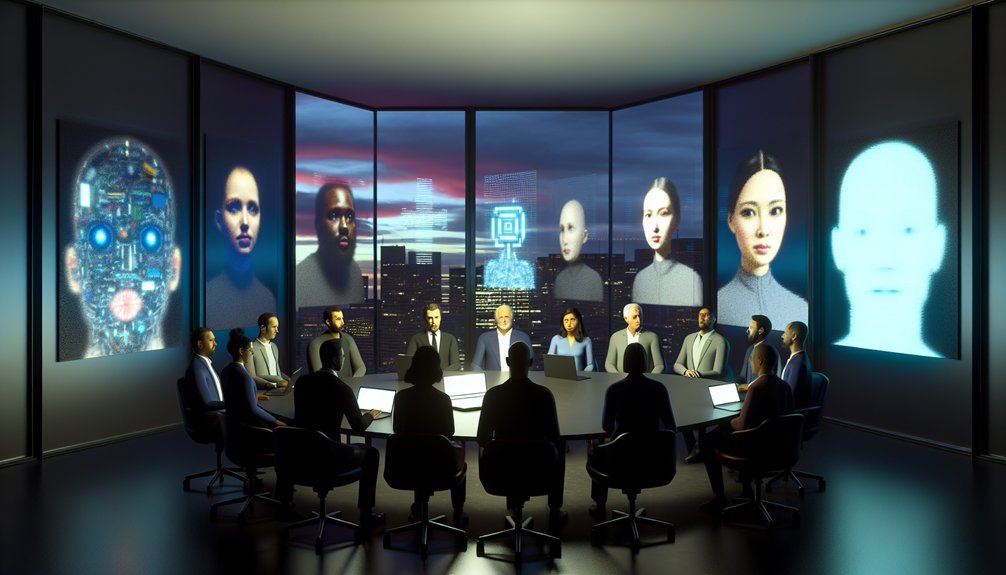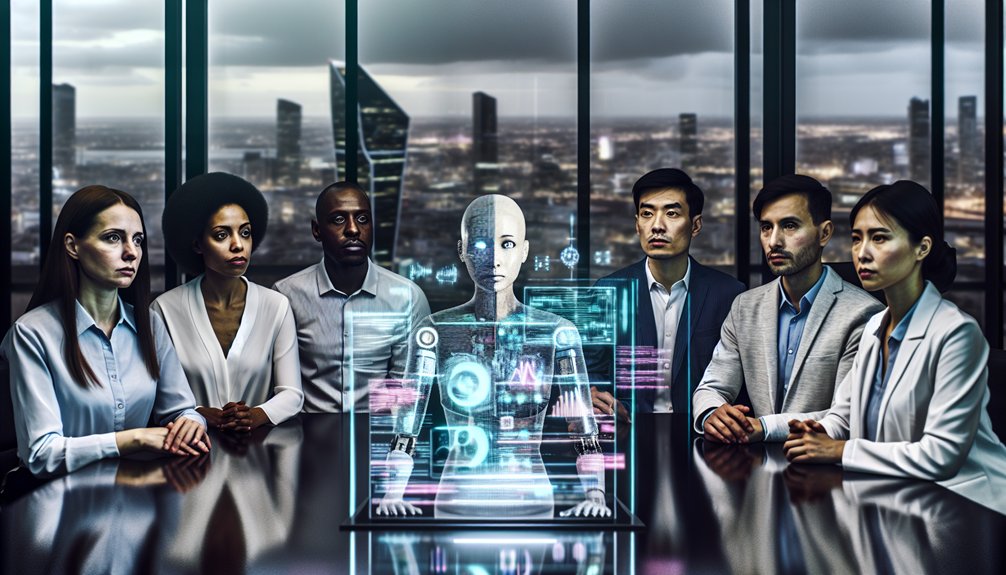
AI’s influence across industries is profound, enhancing efficiency and innovation. In healthcare, AI improves virtual consultations and predicts health issues. The financial sector benefits from algorithmic trading and risk management. Manufacturing sees increased competitiveness through smart factories and predictive maintenance. In retail, personalized experiences and precise inventory management are key. Automotive advances include autonomous vehicles and predictive upkeep. Curious about the extent of these transformations? There’s more to discover beyond these insights.
Transformations in Healthcare Delivery

As AI continues to permeate various sectors, its impact on healthcare delivery is nothing short of transformative. You’re witnessing telemedicine growth at an unprecedented rate, with AI enhancing virtual consultations’ efficiency and accessibility. This expansion provides patients with timely care and reduces the burden on physical healthcare facilities. In addition, predictive analytics is revolutionizing patient management by analyzing vast datasets to forecast potential health issues before they become critical. You can expect AI-driven models to predict disease outbreaks and tailor personalized treatment plans, improving patient outcomes considerably. In this evolving landscape, understanding AI’s role in healthcare guarantees you’re prepared for a future where technology and medicine collaborate seamlessly, ultimately delivering superior healthcare experiences and fostering preventive care approaches.
Revolutionizing the Financial Sector
While many industries grapple with integrating AI, the financial sector stands out for its rapid adaptation and innovation. You see AI’s influence in algorithmic trading, where systems execute trades at lightning speed, leveraging vast datasets to optimize investment returns. These algorithms analyze market trends, reducing human error and enabling traders to react swiftly to market shifts. In risk management, AI helps forecast potential financial threats by analyzing complex data patterns. This predictive capability allows institutions to mitigate risks before they escalate, ensuring stability and security. AI’s ability to process and interpret large volumes of data provides a competitive edge, reducing operational costs and enhancing decision-making accuracy. The financial sector’s AI adoption demonstrates a profound shift towards efficiency and precision.
Advancements in Manufacturing Processes

Driven by technological innovation, the manufacturing industry is experiencing significant advancements thanks to AI integration. Smart factories are at the forefront, employing real-time data analytics to streamline operations and improve efficiency. You can see how AI-driven systems enable predictive maintenance, reducing downtime by anticipating equipment failures before they occur. This not only saves costs but also extends machinery lifespan.
Incorporating AI into manufacturing processes allows for better resource allocation and enhanced production quality. You’ll notice that AI algorithms optimize supply chain management, ensuring timely delivery and reduced waste. By integrating AI, the manufacturing landscape is shifting towards more adaptive and responsive systems, resulting in increased competitiveness. Ultimately, AI’s role in manufacturing is pivotal, driving transformative changes across the industry.
Enhancements in Retail and E-commerce
In the domain of retail and e-commerce, AI’s integration is revolutionizing the way businesses understand and interact with consumers. By harnessing machine learning algorithms, you can offer personalized shopping experiences that cater to individual preferences. AI analyzes vast amounts of data, predicting consumer behavior and tailoring product recommendations. This results in a more engaging shopping journey and increased conversion rates. Moreover, AI enhances inventory management by accurately forecasting demand. You’ll minimize overstock and stockouts, optimizing storage costs and ensuring product availability. The application of AI in these areas isn’t just about efficiency; it’s about precision and anticipation. Businesses that leverage AI see improvements in customer satisfaction and operational performance, setting a new benchmark in the retail landscape.
Innovations in the Automotive Industry

As the automotive industry evolves, AI is steering significant advancements, reshaping how vehicles are designed, manufactured, and operated. You’re witnessing the rise of autonomous vehicles, with AI algorithms processing vast datasets to enable real-time decision-making and enhance safety. According to industry reports, the global autonomous vehicle market is projected to grow at a CAGR of 22.3% by 2030.
Moreover, predictive maintenance is revolutionizing vehicle upkeep. By analyzing data from sensors, AI can predict when parts will fail, reducing downtime by up to 20% and maintenance costs by 10-15%. This data-driven approach guarantees vehicle longevity and reliability. As an informed observer, you’ll appreciate how AI-driven innovations are not just futuristic concepts but are actively transforming the automotive landscape today.
Frequently Asked Questions
How Does AI Impact the Agriculture Sector?
You see AI transforming agriculture by enhancing precision farming techniques. It predicts yields accurately through data analysis, allowing you to optimize resource use. This boosts productivity, reduces costs, and improves sustainability, making your farming operations more efficient.
What Role Does AI Play in Education?
Imagine a child thriving with AI-driven personalized learning, releasing their potential. AI boosts administrative efficiency by analyzing data to streamline processes, allowing educators to focus more on teaching. You’ll see improved outcomes and a more engaging education experience.
How Is AI Being Utilized in the Energy Industry?
You’re seeing AI revolutionize the energy industry by optimizing smart grids, enabling predictive maintenance, and enhancing energy efficiency. It also plays a vital role in renewable integration, ensuring seamless adoption and reliability of sustainable energy sources.
What Are the Ethical Concerns of AI in Creative Arts?
Imagine stumbling upon a painting identical to your original work. AI can blur lines in creative arts, raising ethical concerns about intellectual property and artistic authenticity. You must navigate these issues to maintain creative integrity and ownership.
How Does AI Influence the Entertainment Industry?
AI transforms the entertainment industry by optimizing streaming analytics to predict viewer preferences and enhance content personalization. You’ll experience tailored recommendations, increasing viewer engagement and satisfaction while platforms gain insights into trends, maximizing content delivery efficiency and profitability.
Conclusion
You’ve navigated a landscape where AI’s impact is as varied as a painter’s palette. In healthcare, it’s a scalpel of precision; in finance, a compass guiding investments. Manufacturing hums with AI’s efficiency, while retail and e-commerce sparkle with personalized experiences. The automotive industry races ahead, fueled by innovation. Each sector reaps a data-driven harvest, transforming challenges into opportunities. As AI continues to evolve, keep your eyes peeled—it’s only the beginning of this technological odyssey.



